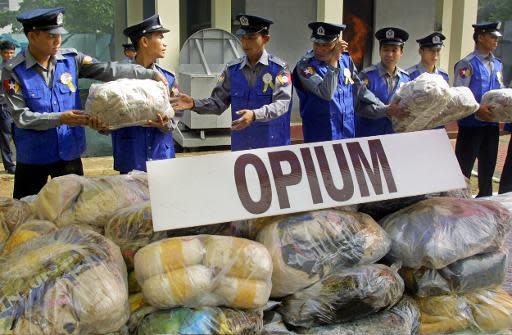Myanmar opium production highest in over a decade: UN

Yangon (AFP) - Opium production in Myanmar soared this year to its highest level in over a decade, the UN said Wednesday, with poor poppy farmers increasingly reliant on the crop in unrest-hit borderlands.
Myanmar, the world's second largest opium producer after Afghanistan, saw a 26 percent leap in production this year, according to estimates by the United Nations Office on Drugs and Crime (UNODC).
It said the 870 tonnes estimated to have been produced in the country in 2013 was the largest since UN and government monitoring began in 2002.
The figure was driven both by higher yields and a larger area under cultivation in war-torn eastern regions of Myanmar, where dramatic political changes have yet to translate into tangible economic benefits for many impoverished people.
"Opium farmers are not bad people, they are poor people," said Jason Eligh, UNODC Myanmar country manager.
"Villagers threatened with food insecurity and poverty need sustainable economic alternatives or they will continue, out of desperation, to grow opium as a cash crop."
Myanmar was once the world's biggest source of opium at the heart of the Golden Triangle -- where its remote border regions abut those of Thailand and Laos.
Production levels, which slumped towards the end of the last century and hit a nadir around 2005, have since climbed steadily, although the country still produces a fraction of Afghanistan's output.
Between them Laos and Myanmar produced 893 tonnes of opium this year ?- 18 percent of global opium production and more than double the amount in 2005.
Poppies are mainly grown in Shan state on Myanmar's border with Thailand, and Kachin state further north, where ethnic minority rebels have battled government troops for years.
The area under cultivation in Myanmar rose to 57,800 hectares (142,826 acres) in 2013, according to estimates in the latest annual UNODC Southeast Asia Opium survey.
That is 13 percent higher than 2012 and more than double the area planted in 2006.
Some 92 percent of surveyed Myanmar poppy farmers, who scratch a living on remote mountainsides, said they grew the crop to cover living costs, according to the report.
The UN also highlighted fears that drug use in the region was on the rise, potentially providing further fuel for the opium market.
It said the number of registered heroin and synthetic drug users in China has been rising since 2007.
"This increase in drug production and use represents a clear threat to human security and health," the report said.


